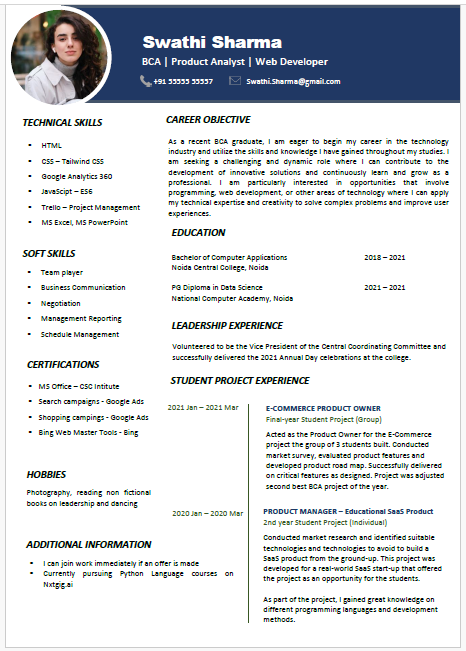Product Analyst
BCA

About this template
This is a very simple and professional resume which can effectively highlight your skills and experiences in a clear and concise manner.
This resume is made by MS Word, featuring a clean and modern layout designed to highlight your skills and achievements.
Some most common and important technical skills for BCA, Product Analyst
For a BCA graduate aiming to become a Product Analyst, a diverse array of technical skills is essential for analyzing product data, understanding user interactions, and contributing to product strategy. Here are ten important technical skills:
1. Data Analysis:
Proficiency in data analysis tools and techniques is crucial. Skills in Excel, SQL, and statistical software help in extracting, analyzing, and interpreting data to inform product decisions.
2. Programming Languages:
Basic knowledge of programming languages like Python or R can be highly beneficial. These skills allow for more complex data manipulation and automation of repetitive tasks.
3. Product Management Software:
Familiarity with product management tools such as Jira, Trello, or Asana is important for tracking product development cycles, managing tasks, and collaborating across teams.
4. User Experience (UX) Design:
Understanding the fundamentals of UX design, including user research, persona creation, and usability testing, is vital. This knowledge helps in assessing how changes will impact the user experience.
5. Data Visualization:
Skills in data visualization tools like Tableau or Power BI are essential for creating intuitive dashboards and reports that effectively communicate insights to stakeholders.
6. Customer Journey Mapping:
The ability to map out and analyze customer journeys helps in identifying pain points and opportunities for improvement within the product experience.
7. Market Research:
Conducting and analyzing market research is key to understanding competitive landscape, market trends, and customer needs. This informs strategic product decisions.
8. A/B Testing:
Knowledge of A/B testing methodologies is crucial for validating hypotheses about product changes and optimizing user experiences based on empirical data.
9. Business Intelligence Tools:
Proficiency with business intelligence tools helps in monitoring product performance metrics and KPIs, enabling data-driven decision-making.
10. Agile Methodologies:
Understanding Agile methodologies is important for working effectively in most modern software development environments. This includes familiarity with sprint planning, stand-ups, and retrospectives.
Conclusion:
These technical skills equip a BCA graduate with the tools needed to effectively analyze product data, understand user needs, and contribute to the strategic direction of product development.